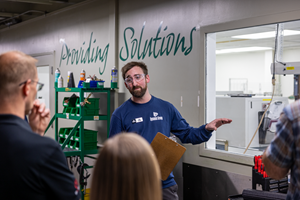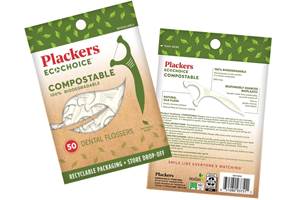Borealis, R&D Startup Collaborate on Low-Cost, High-Performance, Sustainable Single-Use Polyolefin Foam Packaging
Bocatech’s EcoCore molding technology combined with two key Borealis PP grades produces eco-friendly molded products that require less material.
It is always exciting to report on new technology, particularly when it both offers high performance and also is “kind” to the environment. Naturally, single-use food and beverage packaging advances are at the top of the heap of interest as so much of it is consumed on a daily basis and then wasted, and market demand for reusable and more easily recyclable replacement solutions is rising.
Among an increasing number of resin companies that are taking a lead in this sustainability direction, often through partnerships with new technology startups, is Austria’s Borealis (U.S. office in Port Murray, N.J.), recognized as a leader of innovative solutions in the fields of polyolefins, base chemicals and fertilizers. The company recently announced a new strategic alliance with Bockatech, a UK early stage Greentech R&D firm and provider of its patented EcoCore technology—a new plastic molding technology for sustainable packaging.
This new material and technology partnership are expected to advance the circular economy by developing low-cost, high-performance, reusable, and recyclable foam injection molded packaging. This open-innovation agreement is also expected to accelerate the development of Bockatech’s technology, broadening the platform so that it can be licensed to more manufacturing partners in a variety of markets for multiple applications.
According to the partners, the EcoCore technology in combination with two key Borealis PP grades is an eco-friendly way to produce high-performance packaging that is reusable and recyclable. The two grades are:
● Borealis grade BH381MO is a heterophasic copolymer, which is characterized by an optimum combination of very high stiffness and high-impact strength. This grade uses Borealis Nucleation Technology (BNT) to increase productivity by cycle time reduction. BNT, in combination with excellent stiffness and good flow properties is said to create high potential for wall-thickness reduction. Products originating from this grade boast very good demolding properties, well-balanced mechanical properties, excellent dimensional consistency with respect to different colors and good organoleptic properties.
● Daploy WB140HMS (high-melt strength), meanwhile, is touted as a PP with an LDPE-like processability. This new product family for packaging applications is said to make possible the production of extruded PP foams with a wide density range and a broad property profile. WB140HMS is a long chain-branched PP developed for the foam extrusion process. Unlike conventional PP, it has HMS plus greatly increased extensibility in the melt phase. This is also the case when the grade and its blends are combined with other PP materials. Based on the unique rheological behavior of WB140HMS, cell growth and foam structure can be stabilized much better than when using conventional PP. Collapse and coalescence of cells is reportedly prevented or significantly reduced, enabling the manufacture of closed-cell, low-density foams. Significant weight reduction is claimed with up to 30-fold volume expansion on production lines said to be achievable.
Foamed molded products made with EcoCore require less material and have faster cycle times to reduce material costs, energy use and environmental impact. Investment costs for new equipment are also minimal, say the partners. Reusable and recyclable end products made using EcoCore feature high strength and a smooth surface finish ready for printing. The foam core also offers excellent insulation and is ultra-lightweight. Their high strength also makes them ideal for deposit return schemes that have been proven to deliver material recovery rates of up to 94% and reduce the likelihood of plastics entering the marine environment. As mono-material packaging, EcoCore solutions are 100% recyclable. Applications can include:
● Cups—ranging from insulated to-go hot coffee cups for quick-service restaurants (QSRs) to beer and soft-drink containers for sports events and festivals.
● Pots—insulated pots for instant noodles and bowls, as well as other containers for soups and stews from QSRs.
● Tubs—for foods in the frozen and cold cabinets at both supermarkets and QSRs—from ice cream to yogurt and butter.
● Trays—insulated trays for microwaveable ready meals, as well as packaging for meats and delicate fruits.
Said Andreas Leitner, head of new business development at Borealis, “As strong advocates for the circular economy within our industry, we at Borealis are eager to partner with pioneering firms like Bockatech to develop polyolefins-based solutions that are reusable and recyclable. Combining our foam products with EcoCore technology to produce innovative, lightweight solutions is more than an exciting business opportunity: it’s a real step forward for more circularity in packaging.”
Added Chris Bocking, CEO and founder of Bockatech,“We’re delighted to have found in Borealis a partner who shares our commitment to developing new solutions for innovative packaging with reduced environmental impact. Combining our EcoCore technology with Borealis materials and expertise in foam will produce viable new applications, which offer significant benefits for businesses, consumers and the environment.”
Related Content
Medical Molder, Moldmaker Embraces Continuous Improvement
True to the adjective in its name, Dynamic Group has been characterized by constant change, activity and progress over its nearly five decades as a medical molder and moldmaker.
Read MoreUS Merchants Makes its Mark in Injection Molding
In less than a decade in injection molding, US Merchants has acquired hundreds of machines spread across facilities in California, Texas, Virginia and Arizona, with even more growth coming.
Read MoreHow to Optimize Injection Molding of PHA and PHA/PLA Blends
Here are processing guidelines aimed at both getting the PHA resin into the process without degrading it, and reducing residence time at melt temperatures.
Read MoreFor Extrusion and Injection-Blow Molders, Numerous Upgrades in Machines and Services
Uniloy is revising its machinery lines across the board and strengthening after-sales services in tooling maintenance, spare parts and tech service.
Read MoreRead Next
Making the Circular Economy a Reality
Driven by brand owner demands and new worldwide legislation, the entire supply chain is working toward the shift to circularity, with some evidence the circular economy has already begun.
Read MoreFor PLASTICS' CEO Seaholm, NPE to Shine Light on Sustainability Successes
With advocacy, communication and sustainability as three main pillars, Seaholm leads a trade association to NPE that ‘is more active today than we have ever been.’
Read MoreSee Recyclers Close the Loop on Trade Show Production Scrap at NPE2024
A collaboration between show organizer PLASTICS, recycler CPR and size reduction experts WEIMA and Conair recovered and recycled all production scrap at NPE2024.
Read More


























